Travelling for work is an inevitability for most jobs – and if those journeys are frequent and by car, your employer might decide to help you drive something newer and more fuel-efficient. Often that will involve some form of lease.
Vehicle leasing came to the UK in the 1950s. It’s effectively a long-term rental, with fixed monthly costs that often include everything except fuel and a simple trade-in at the end of the contract. As long as the car is in good condition and within its agreed mileage limit, you just hand over the keys and select your next one with nothing else to pay.
It’s popular: there are 1.5 million lease cars in the UK, according to the British Vehicle Rental and Leasing Association (BVRLA), and there are a few different set-ups if you’re in the market for a workhorse.
Here’s how to figure out which one is right for you.
Company car
Some jobs, especially if they’re senior or involve a lot of driving, include a company car that can be used outside office hours.
Most of these are leased, and the monthly rentals are covered by your employer as a workplace perk. Getting a car is a good reason to join or stick with a company.
Of course, there’s no such thing as a free lunch. As a driver, you will pay a small tax bill for getting a ‘benefit in kind’ (BIK) – a benefit provided on top of your salary. For cars, that’s a CO2-weighted percentage of the list price, taxed at the same rate as your income (usually 20% or 40%) and deducted from your wages.
It’s a cheap way to drive a new car, especially if that car is a plug-in hybrid or electric car.
For example, a 20% income taxpayer in a Ford Puma Gen-E would pay £16 per month, while even someone in the 40% bracket could get into a Tesla Model Y for £49. That’s a lot less than the cost of a personal lease.
Company car schemes can be restrictive: most employers will only offer what’s called a ‘choice list’ of vehicles, sometimes from a few selected manufacturers, and drivers are usually limited to a specific grade of car based on their salary.
Some are also CO2-capped, although high-emission vehicles tend to have prohibitively expensive BIK tax rates anyway, so you’re better off leasing those privately. Also, you can’t take your company car with you if you leave.
Employers can offer some flexibility. Drivers can make a cash contribution of up to £5000 towards an upgrade, which is taken off the list price and results in a smaller tax bill, or trade down into a lower vehicle grade and use the rest to top up their wages.
Salary sacrifice
Salary sacrifice is a type of company car scheme, but as a driver it will feel more like a personal lease.
You select a car, your employer leases it on your behalf then deducts the monthly rental cost from your gross salary with a corresponding reduction in income tax and National Insurance contributions.
Naturally there’s a tax cost for the car. For anything emitting up to 75g/km of CO2 (mostly plug-in hybrid and electric vehicles), you will pay low-rate BIK tax, just like with a company car. But the total cost, including the monthly rentals, is usually lower than leasing that same car privately.






Add your comment